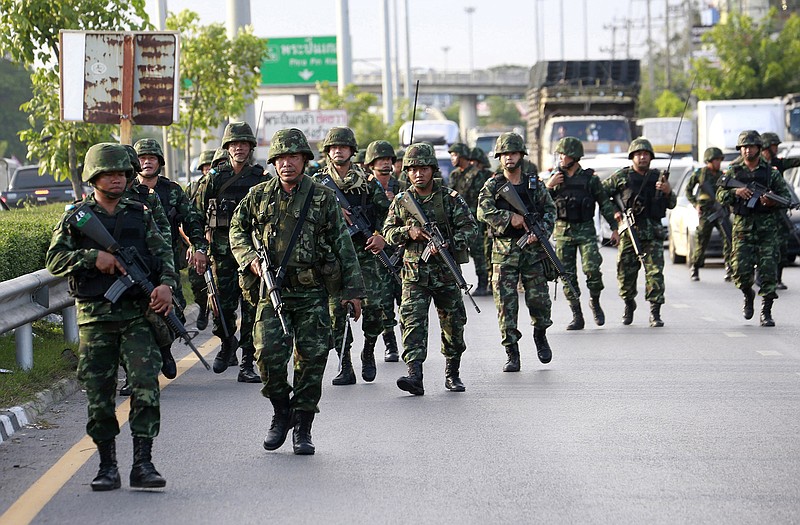BANGKOK (AP) - Without firing a shot, Thailand's powerful military seized control of this volatile Southeast Asian nation Thursday, suspending the constitution and detaining Cabinet ministers in a risky bid to end half a year of political upheaval that many fear will only deepen the nation's crisis.
The coup, the second in eight years, accomplished in a few minutes what anti-government protesters backed by the nation's traditional elite and staunch royalists had failed to achieve on the street: the overthrow of a democratically elected government they had accused of corruption.
The new junta leader, army chief Gen. Prayuth Chan-ocha, announced he was taking power almost immediately after talks between the nation's bitter political rivals - which lasted a mere four hours over the last two days - ended in deadlock and the government refused to resign.
Prayuth claimed he had to act to restore stability and "quickly bring the situation back to normal" amid increasing spasms of violence that together with controversial court rulings had rendered the government powerless and the country profoundly divided.
But troubles for Thailand, a regional economic hub whose idyllic white-sand beaches and elephant-filled jungles draw millions of tourists a year, could be just beginning.
"We're likely to see dark days ahead," said Thitinan Pongsudhirak, a political analyst at Bangkok's Chulalongkorn University, referring to the possibility of violent resistance from the ousted government's supporters.
The deposed administration of acting Prime Minister Niwattumrong Boonsongpaisan, which was summoned to appear before the junta Thursday night, seemed to have gone into hiding and made no statement condemning the coup. Four of its ministers, ordered to an army compound for talks earlier in the day, were in custody, along with top protest leaders.
"The rest of us who are outside are still fine and in safe places," said the ex-premier's adviser, Paradorn Pattanathabutr. "The situation is very worrying. We ... don't know what else can happen."
The army, which imposed martial law in a surprise move Tuesday that many sensed was a prelude to taking full power, imposed a nationwide curfew that began at 10 p.m. - a clear sign it is concerned about potential unrest. During the last coup, in 2006, Bangkok residents moved freely and wrapped yellow ribbons and flowers around tank turrets until dawn.
Prayuth called on the public not to panic this time, either. But the vast capital's elevated train, subway and bus stations shut down early, filling with long queues as anxious office workers rushed home along increasingly empty streets.
After nightfall, troops deployed armored personnel carriers to block main roads, including one in front of the U.S. Embassy, and diverted traffic at key intersections. Major highways were virtually devoid of traffic, extraordinary for the normally bustling metropolis of 10 million.
International cable news channels, including CNN and BBC, were taken off air.
Earlier, armed troops dispersed demonstrators from protest sites where competing groups were camped out - one filled with thousands of Red Shirts who support the now-ousted elected government, the other with those who had struggled for seven months to unseat it.
U.S. Secretary of State John Kerry condemned the takeover and warned it would "have negative implications for the U.S.-Thai relationship," but did not announce immediate punitive steps. The State Department said it was reviewing millions in aid.
"There is no justification for this military coup," Kerry said in a statement that also called for the release of detained political leaders and a return of press freedom.
The day's dramatic events were the culmination of a societal schism laid bare after the 2006 coup deposed former Prime Minister Thaksin Shinawatra, a billionaire tycoon whose populist movement has won every national election since 2001.
The conflict pits a majority rural poor in the north and northeast, who benefited from Thaksin's populist policies, against an urban-based elite based in Bangkok and the south that is concerned it is losing power.
It is a divide that has led to upheaval multiple times in recent years, and sometimes death. The latest crisis alone has claimed 28 lives and left more than 800 wounded since November.

